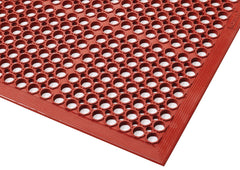Food processing matting is distinct from other types of industrial matting due to its specialised features and design considerations that cater specifically to the unique demands of food processing environments. Here's what sets it apart:
Hygiene-Centric Materials: Food processing mats are made from materials that are easy to clean and disinfect. They are often non-porous to prevent bacteria growth and contamination, a crucial aspect due to the strict hygiene standards in food processing.
Chemical and Water Resistance: These mats are designed to resist common chemicals, oils, and water used in food processing, ensuring they can withstand the environment without degrading. This is only sometimes a requirement for general industrial matting.
Slip-Resistant Surface: While slip resistance is important in all industrial matting, it's particularly crucial in food processing, where spills of liquids and food products are more common. These mats are designed with enhanced grip to prevent slips and falls.
Food processing mats are an excellent choice in the beverage production industry due to their ability to withstand harsh operational environments and meet high safety requirements. These mats are designed to provide a non-slip surface, allowing workers to move around safely and efficiently while handling liquids and other materials.
Additionally, they are resistant to chemicals and can withstand high temperatures without melting or warping, making them ideal for use in beverage production facilities where sanitation and safety are paramount. By using food processing mats, beverage production facilities can ensure a clean and safe work environment for their employees while maintaining high levels of productivity and efficiency.





